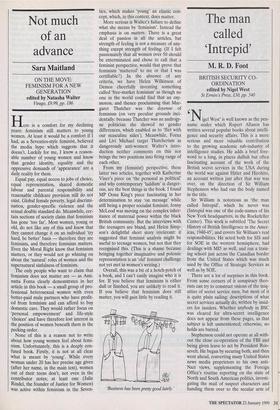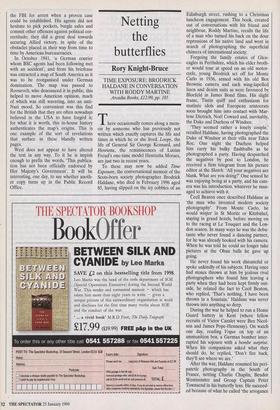The man called `Intrepid'
M. R. D. Foot BRITISH SECURITY CO- ORDINATION edited by Nigel West St Ermin's Press, £30, pp. 540 Nigel West' is well known as the pen- name under which Rupert Allason has written several popular books about intelli- gence and security affairs. This is a more serious and more valuable contribution to the growing academic sub-industry of intelligence studies. He adds a brief fore- word to a long, in places dullish but often fascinating account of the work of the British secret services in the USA during the world war against Hitler and Hirohito, an account written just after that war was over, on the direction of Sir William Stephenson who had run the body named in the title.
Sir William is notorious as 'the man called Intrepid', which he never was (Intrepid was one of the code-names of his New York headquarters, in the Rockefeller Center). This work is subtitled 'The Secret History of British Intelligence in the Amer- icas, 1940-45', and covers Sir William's real responsibilities. He acted both for SIS and for SOE in the western hemisphere, had dealings with MI5 as well, and ran a train- ing school just across the Canadian border from the United States which was much used by the Office of Strategic Services as well as by SOE.
There are a lot of surprises in this book. From some corners of it conspiracy theo- rists can try to construct visions of the iniq- uities of secret service men, but most of it is quite plain sailing: descriptions of what secret services actually do, written by insid- ers for insiders. Whether anybody in BSC was cleared for ultra-secret intelligence does not appear from these pages, as that subject is left unmentioned; otherwise, no holds are barred.
Stephenson could not operate at all with- out the close co-operation of the FBI and being given leave to act by President Roo- sevelt. He began by securing both, and then went ahead, converting many United States news media proprietors to his own anti- Nazi views, supplementing the Foreign Office's routine reporting on the state of North and South American politics, investi- gating the mail of suspect characters and handing them over to the secular arm of the FBI for arrest when a proven case could be established. His agents did not hesitate to pick pockets, burgle safes and commit other offences against political cor- rectitude; they did a great deal towards securing Allied victory, in spite of the obstacles placed in their way from time to time by American bureaucracies.
In October 1941, 'a German courier whom BSC agents had been following met with an accident', and from his briefcase was extracted a map of South America as it was to be reorganised under German domination. The map was passed to Roosevelt, who denounced it in public; this helped to move American opinion, much of which was still wavering, into an anti- Nazi mood. So convenient was this find for the British that they are often nowadays believed in the USA to have forged it; for what it is worth, this in-house history authenticates the map's origins. This is one example of the sort of revelations that surface in these blandly written pages.
West does not appear to have altered the text in any way. To it he is impish enough to prefix the words, 'This publica- tion has not been officially endorsed by Her Majesty's Government'. It will be interesting, one day, to see whether anoth- er copy turns up in the Public Record Office.



























































 Previous page
Previous page